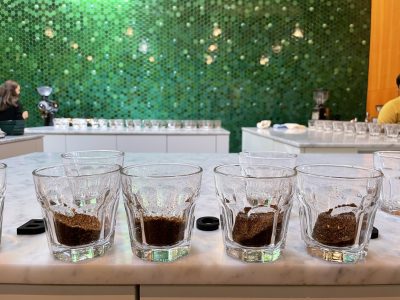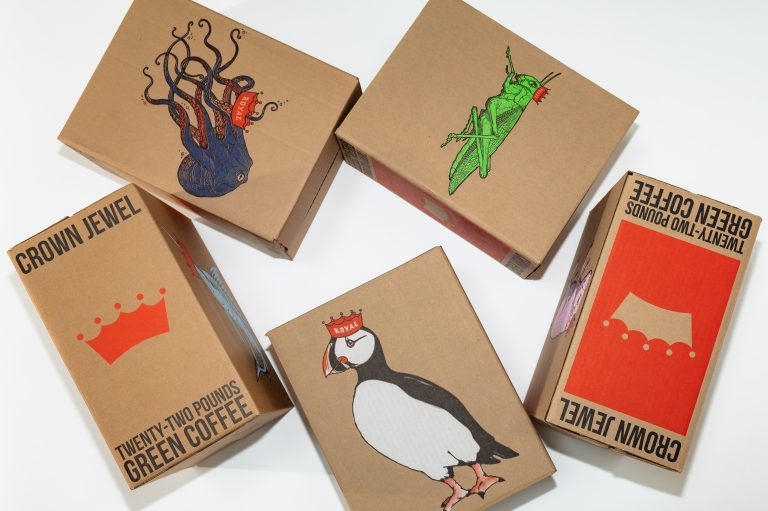Since the mid-1980’s, Royal Coffee has had a special relationship with the country of Ethiopia and the incredible coffees it produces. Starting with Mohammed Ogsadey and later, his nephew Rashid Abdullahi, continuing through the establishment of the Cooperative Unions and the installment of the Ethiopian Commodity Exchange (ECX) in the mid-aughts, right up to the present period of direct-export liberalization and single farmer empowerment, Royal has always strived to carry the best Ethiopian lineup in the business. Four years ago, I realized that to do this effectively, we needed someone there full time. As it happened, that person magically fell into our lap in the form of Haile Andualem, our man in Addis Ababa.
Flashback to March, 2008. The ECX has been in existence for about a year, and specialty coffee buyers hate everything about it. It is clear the system was not designed with them in mind—it came from the grain trade, and the point was to address market inefficiencies that lead to food shortages, not sell microlots of specialty coffee. As a prospective olive branch, the ECX announces that they will hold a Direct Specialty Trade (DST) auction, in which certain large farms and coops who hold direct export licenses will be able to sell specific chops in a live auction in Addis, with foreign buyers in attendance. (Side note: the fact that you may not remember this ever happening underscores its abject failure. Reserve prices were set too high and much of the coffee went unsold. Buyers weren’t nearly as conditioned back then to the idea of an “auction premium” in places other than Panama. Royal did manage to make some minor history as the buyer of record on the first DST auction lot sold. However, I do think the Alliance for Coffee Excellence is going to have a better go of Ethiopian auctions this time around.)
While the DST itself was a failure, two relationships were created that day which continue to pay dividends. Later on in the auction, Royal purchased a natural process Limu Seka coffee from a guy named Nigusse Lemma. We continue to buy his coffee 11 years later, and indeed customers now ask for it by name.
It was through Nigusse’s family that I first met Haile, while he was assisting them with contract preparation a few seasons later. Though I had corresponded with Haile, I had never met him. That was, until another visit, when he waited for me in the lobby of the Addis Hilton for four hours, simply to meet with me for 15-minutes in order to discuss the coffee trade and his future in it. Haile had been an assistant to visiting Economic Development faculty working in Addis, traveling to various coops and interviewing farmers on how Fair Trade has affected their lives, giving him invaluable insight. We stayed in touch, and I gradually began to give him some work on our behalf, following up on contracts and preshipment samples, helping to arrange transportation, and generally facilitating communication. In 2016, Haile came on full time as a Royal employee. Many of you who’ve visited Ethiopia have already met him, and if you travel with us again this season, you will surely be graced by his presence. The value of Haile’s calm demeanor was fully apparent during a group trip at the end of 2017. He and I had successfully navigated the arrivals of 12 roasters (all on their first ever visits to Ethiopia). Everyone had just checked into the hotel when my phone rang. An attendee had severe cuts from a glass shower, and was being rushed to the emergency room. This was one hour into the trip. I frantically ran over to the hospital. Haile was already there, making sure the hospital was taking good care and joking with the patient. Hopefully, this won’t happen again, but if it does, rest assured we will have you in good hands.
Ethiopia as a country has many built-in advantages for producing incredible coffees: heirloom varietals, ideal terroir, and a native coffee culture unrivaled in any other producing country. In other ways, however, Ethiopia lags far behind its neighbors (Kenya and Rwanda in particular). Its marketing and export procedures can be draconian, and the ability to differentiate individual lots from different parts of a harvest or farm has been nearly non-existent until very recently.
One of the main benefits of having a presence on the ground in Addis has been our ability to keep up with the rapidly changing terrain since the direct export laws were dramatically relaxed for the 2018-2019 season. While Royal had already been working with a group of farmers in Gedeb individually for a few seasons, this year the lid has really come off. The ECX once limited the ability of farms and washing stations to export coffee or deal with foreign markets. That has all changed. This creates a huge opportunity for buyer involvement and farm level investment, but in a part of the country where even cell phones don’t work, having someone in-country is an absolute must. Haile deserves a huge amount of credit for helping to get this program off the ground, and continuing to manage the ever expanding roster of participating farmers.
Where once it was almost impossible for roasters to get beyond the exporters office or a perfunctory washing station visit, having Haile in-country has greatly deepened our connection to the very people responsible for producing the coffees that our customers love so much. While there is still much work to do in this realm, we have laid the groundwork for far more specialized offerings from what is already the premier specialty origin in the world.



I am extremely overwhelmed with huge pleasure and honour to have been able to read about me this from my Boss and Mentor in the Business.
All the past four years have been incredible journey full of valuable lessons, life time opportunity of meeting new and spectacular people along with the day to day pride of being the ‘Royal man in Ethiopia’ which i can’t be modest about.
I very much feel i am not yet started to contribute to the fullest every thing i can to help Royal source and deliver the exceptional coffee our customers deserve to have in time; where by doing so i will love to reach out as many small holder producers and exporters as possible who really needs to have some international market access.
Good say mr.royal /Max/,haile is incredible person he drives the business professionally and trying to search the coffee directly from the origin/farmers /to the final buyers he is in a right spot to develop the sustainability